Legal Aspects of Business: An In-Depth Report on Agency Relationship
VerifiedAdded on 2022/08/08
|13
|3600
|13
Report
AI Summary
This report provides a comprehensive overview of the agency relationship in commercial transactions, defining it as a fiduciary connection where an agent acts on behalf of a principal. The report explores the key features of this relationship, including the importance of consent, authority, and control, as well as the significance of the agent's actions being recognized by the principal. It delves into the duties of an agent, such as following instructions, exercising care and skill, acting in good faith, avoiding conflicts of interest, and maintaining accurate accounting. The report highlights the legal implications of these duties, supported by case law examples, and discusses the responsibilities of both agents and principals. The report emphasizes the agent's role as a representative of the principal, the scope of the agent's authority, and the fiduciary nature of the agency relationship.
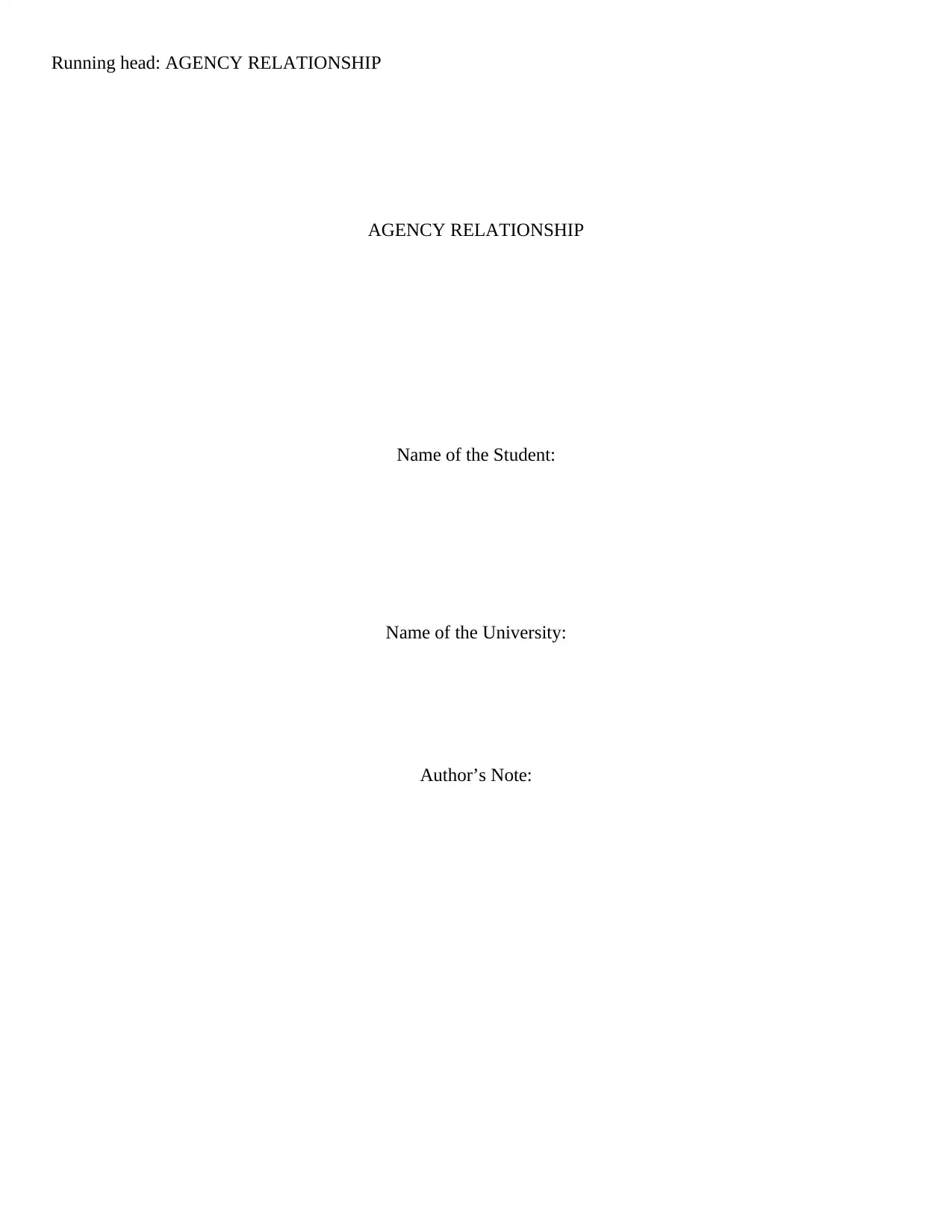
Running head: AGENCY RELATIONSHIP
AGENCY RELATIONSHIP
Name of the Student:
Name of the University:
Author’s Note:
AGENCY RELATIONSHIP
Name of the Student:
Name of the University:
Author’s Note:
Paraphrase This Document
Need a fresh take? Get an instant paraphrase of this document with our AI Paraphraser
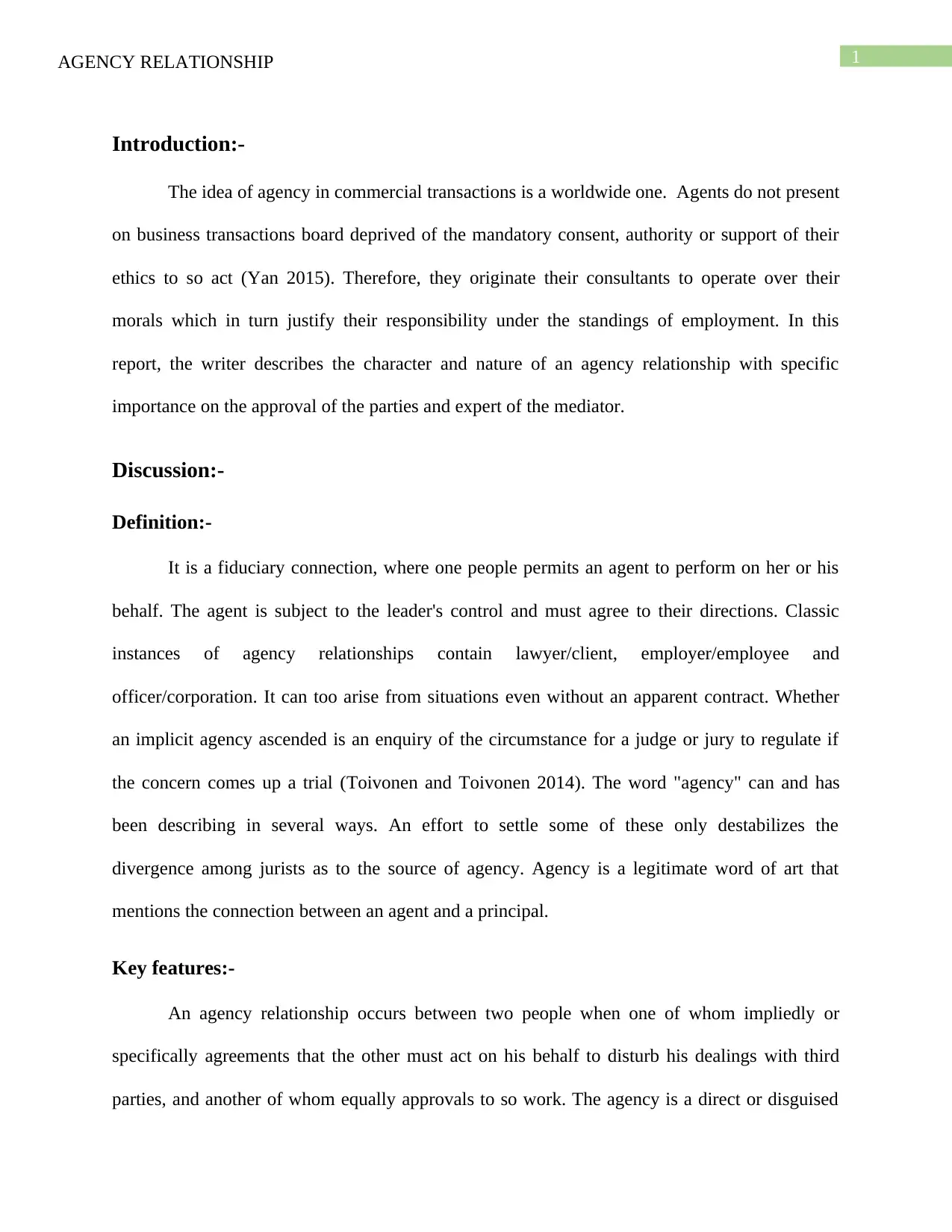
1AGENCY RELATIONSHIP
Introduction:-
The idea of agency in commercial transactions is a worldwide one. Agents do not present
on business transactions board deprived of the mandatory consent, authority or support of their
ethics to so act (Yan 2015). Therefore, they originate their consultants to operate over their
morals which in turn justify their responsibility under the standings of employment. In this
report, the writer describes the character and nature of an agency relationship with specific
importance on the approval of the parties and expert of the mediator.
Discussion:-
Definition:-
It is a fiduciary connection, where one people permits an agent to perform on her or his
behalf. The agent is subject to the leader's control and must agree to their directions. Classic
instances of agency relationships contain lawyer/client, employer/employee and
officer/corporation. It can too arise from situations even without an apparent contract. Whether
an implicit agency ascended is an enquiry of the circumstance for a judge or jury to regulate if
the concern comes up a trial (Toivonen and Toivonen 2014). The word "agency" can and has
been describing in several ways. An effort to settle some of these only destabilizes the
divergence among jurists as to the source of agency. Agency is a legitimate word of art that
mentions the connection between an agent and a principal.
Key features:-
An agency relationship occurs between two people when one of whom impliedly or
specifically agreements that the other must act on his behalf to disturb his dealings with third
parties, and another of whom equally approvals to so work. The agency is a direct or disguised
Introduction:-
The idea of agency in commercial transactions is a worldwide one. Agents do not present
on business transactions board deprived of the mandatory consent, authority or support of their
ethics to so act (Yan 2015). Therefore, they originate their consultants to operate over their
morals which in turn justify their responsibility under the standings of employment. In this
report, the writer describes the character and nature of an agency relationship with specific
importance on the approval of the parties and expert of the mediator.
Discussion:-
Definition:-
It is a fiduciary connection, where one people permits an agent to perform on her or his
behalf. The agent is subject to the leader's control and must agree to their directions. Classic
instances of agency relationships contain lawyer/client, employer/employee and
officer/corporation. It can too arise from situations even without an apparent contract. Whether
an implicit agency ascended is an enquiry of the circumstance for a judge or jury to regulate if
the concern comes up a trial (Toivonen and Toivonen 2014). The word "agency" can and has
been describing in several ways. An effort to settle some of these only destabilizes the
divergence among jurists as to the source of agency. Agency is a legitimate word of art that
mentions the connection between an agent and a principal.
Key features:-
An agency relationship occurs between two people when one of whom impliedly or
specifically agreements that the other must act on his behalf to disturb his dealings with third
parties, and another of whom equally approvals to so work. The agency is a direct or disguised
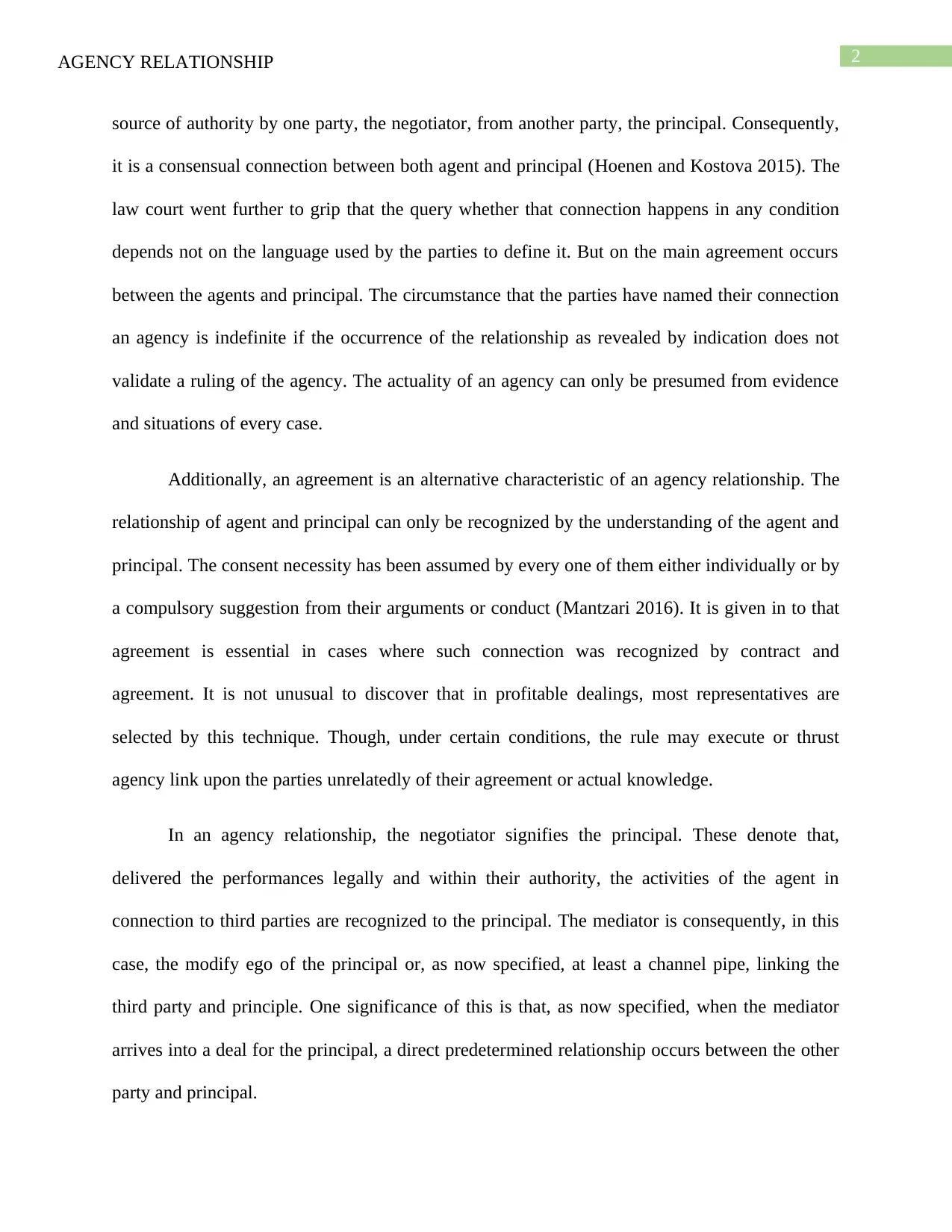
2AGENCY RELATIONSHIP
source of authority by one party, the negotiator, from another party, the principal. Consequently,
it is a consensual connection between both agent and principal (Hoenen and Kostova 2015). The
law court went further to grip that the query whether that connection happens in any condition
depends not on the language used by the parties to define it. But on the main agreement occurs
between the agents and principal. The circumstance that the parties have named their connection
an agency is indefinite if the occurrence of the relationship as revealed by indication does not
validate a ruling of the agency. The actuality of an agency can only be presumed from evidence
and situations of every case.
Additionally, an agreement is an alternative characteristic of an agency relationship. The
relationship of agent and principal can only be recognized by the understanding of the agent and
principal. The consent necessity has been assumed by every one of them either individually or by
a compulsory suggestion from their arguments or conduct (Mantzari 2016). It is given in to that
agreement is essential in cases where such connection was recognized by contract and
agreement. It is not unusual to discover that in profitable dealings, most representatives are
selected by this technique. Though, under certain conditions, the rule may execute or thrust
agency link upon the parties unrelatedly of their agreement or actual knowledge.
In an agency relationship, the negotiator signifies the principal. These denote that,
delivered the performances legally and within their authority, the activities of the agent in
connection to third parties are recognized to the principal. The mediator is consequently, in this
case, the modify ego of the principal or, as now specified, at least a channel pipe, linking the
third party and principle. One significance of this is that, as now specified, when the mediator
arrives into a deal for the principal, a direct predetermined relationship occurs between the other
party and principal.
source of authority by one party, the negotiator, from another party, the principal. Consequently,
it is a consensual connection between both agent and principal (Hoenen and Kostova 2015). The
law court went further to grip that the query whether that connection happens in any condition
depends not on the language used by the parties to define it. But on the main agreement occurs
between the agents and principal. The circumstance that the parties have named their connection
an agency is indefinite if the occurrence of the relationship as revealed by indication does not
validate a ruling of the agency. The actuality of an agency can only be presumed from evidence
and situations of every case.
Additionally, an agreement is an alternative characteristic of an agency relationship. The
relationship of agent and principal can only be recognized by the understanding of the agent and
principal. The consent necessity has been assumed by every one of them either individually or by
a compulsory suggestion from their arguments or conduct (Mantzari 2016). It is given in to that
agreement is essential in cases where such connection was recognized by contract and
agreement. It is not unusual to discover that in profitable dealings, most representatives are
selected by this technique. Though, under certain conditions, the rule may execute or thrust
agency link upon the parties unrelatedly of their agreement or actual knowledge.
In an agency relationship, the negotiator signifies the principal. These denote that,
delivered the performances legally and within their authority, the activities of the agent in
connection to third parties are recognized to the principal. The mediator is consequently, in this
case, the modify ego of the principal or, as now specified, at least a channel pipe, linking the
third party and principle. One significance of this is that, as now specified, when the mediator
arrives into a deal for the principal, a direct predetermined relationship occurs between the other
party and principal.
⊘ This is a preview!⊘
Do you want full access?
Subscribe today to unlock all pages.

Trusted by 1+ million students worldwide
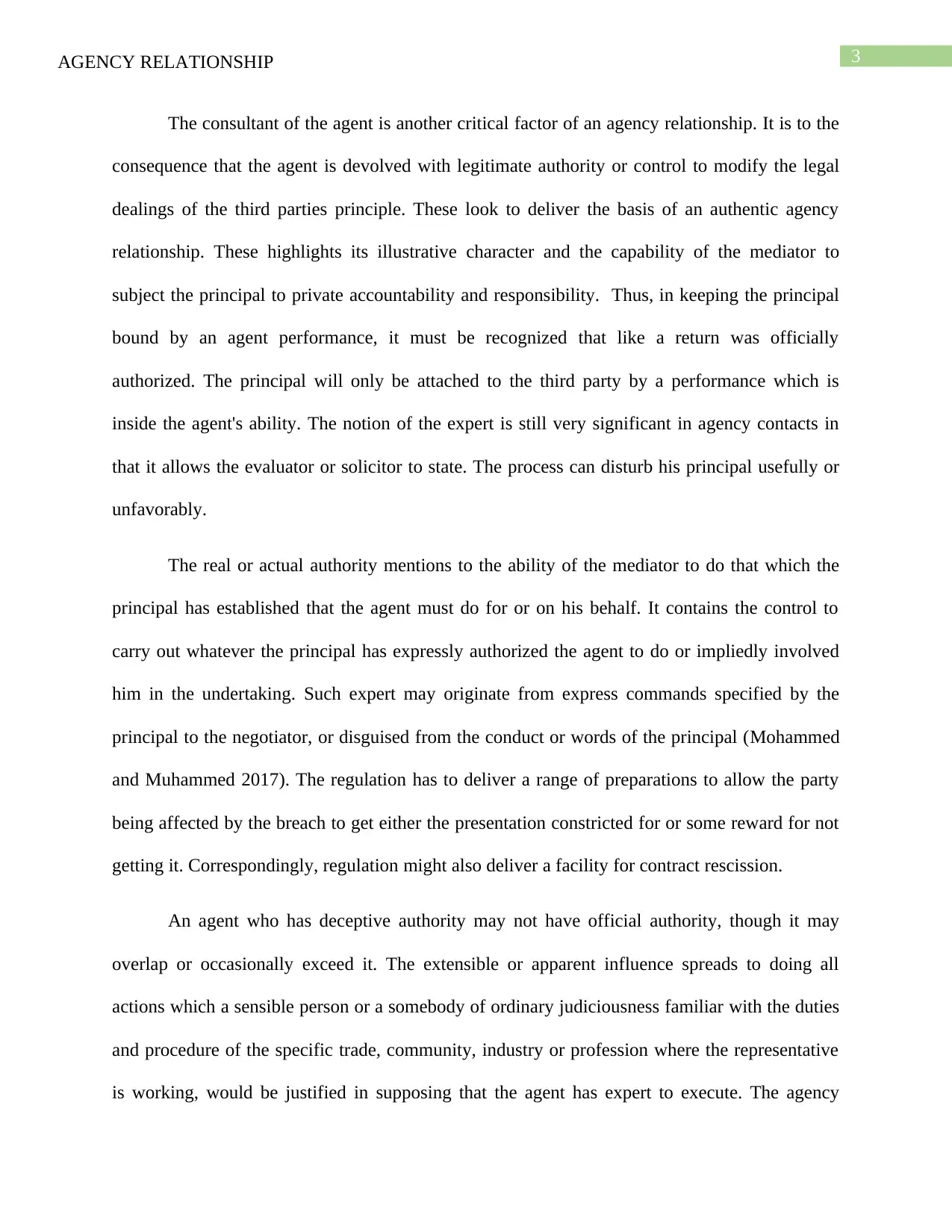
3AGENCY RELATIONSHIP
The consultant of the agent is another critical factor of an agency relationship. It is to the
consequence that the agent is devolved with legitimate authority or control to modify the legal
dealings of the third parties principle. These look to deliver the basis of an authentic agency
relationship. These highlights its illustrative character and the capability of the mediator to
subject the principal to private accountability and responsibility. Thus, in keeping the principal
bound by an agent performance, it must be recognized that like a return was officially
authorized. The principal will only be attached to the third party by a performance which is
inside the agent's ability. The notion of the expert is still very significant in agency contacts in
that it allows the evaluator or solicitor to state. The process can disturb his principal usefully or
unfavorably.
The real or actual authority mentions to the ability of the mediator to do that which the
principal has established that the agent must do for or on his behalf. It contains the control to
carry out whatever the principal has expressly authorized the agent to do or impliedly involved
him in the undertaking. Such expert may originate from express commands specified by the
principal to the negotiator, or disguised from the conduct or words of the principal (Mohammed
and Muhammed 2017). The regulation has to deliver a range of preparations to allow the party
being affected by the breach to get either the presentation constricted for or some reward for not
getting it. Correspondingly, regulation might also deliver a facility for contract rescission.
An agent who has deceptive authority may not have official authority, though it may
overlap or occasionally exceed it. The extensible or apparent influence spreads to doing all
actions which a sensible person or a somebody of ordinary judiciousness familiar with the duties
and procedure of the specific trade, community, industry or profession where the representative
is working, would be justified in supposing that the agent has expert to execute. The agency
The consultant of the agent is another critical factor of an agency relationship. It is to the
consequence that the agent is devolved with legitimate authority or control to modify the legal
dealings of the third parties principle. These look to deliver the basis of an authentic agency
relationship. These highlights its illustrative character and the capability of the mediator to
subject the principal to private accountability and responsibility. Thus, in keeping the principal
bound by an agent performance, it must be recognized that like a return was officially
authorized. The principal will only be attached to the third party by a performance which is
inside the agent's ability. The notion of the expert is still very significant in agency contacts in
that it allows the evaluator or solicitor to state. The process can disturb his principal usefully or
unfavorably.
The real or actual authority mentions to the ability of the mediator to do that which the
principal has established that the agent must do for or on his behalf. It contains the control to
carry out whatever the principal has expressly authorized the agent to do or impliedly involved
him in the undertaking. Such expert may originate from express commands specified by the
principal to the negotiator, or disguised from the conduct or words of the principal (Mohammed
and Muhammed 2017). The regulation has to deliver a range of preparations to allow the party
being affected by the breach to get either the presentation constricted for or some reward for not
getting it. Correspondingly, regulation might also deliver a facility for contract rescission.
An agent who has deceptive authority may not have official authority, though it may
overlap or occasionally exceed it. The extensible or apparent influence spreads to doing all
actions which a sensible person or a somebody of ordinary judiciousness familiar with the duties
and procedure of the specific trade, community, industry or profession where the representative
is working, would be justified in supposing that the agent has expert to execute. The agency
Paraphrase This Document
Need a fresh take? Get an instant paraphrase of this document with our AI Paraphraser
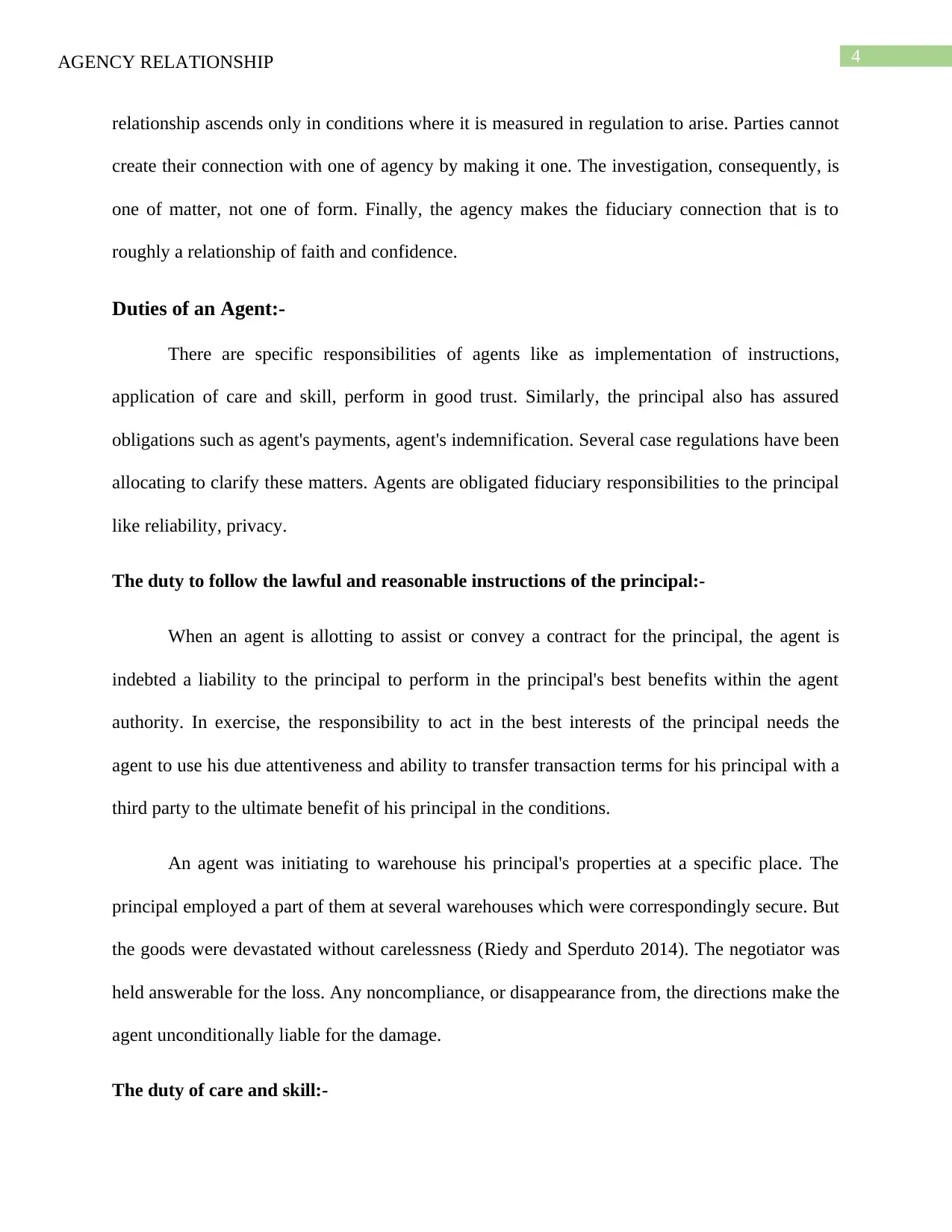
4AGENCY RELATIONSHIP
relationship ascends only in conditions where it is measured in regulation to arise. Parties cannot
create their connection with one of agency by making it one. The investigation, consequently, is
one of matter, not one of form. Finally, the agency makes the fiduciary connection that is to
roughly a relationship of faith and confidence.
Duties of an Agent:-
There are specific responsibilities of agents like as implementation of instructions,
application of care and skill, perform in good trust. Similarly, the principal also has assured
obligations such as agent's payments, agent's indemnification. Several case regulations have been
allocating to clarify these matters. Agents are obligated fiduciary responsibilities to the principal
like reliability, privacy.
The duty to follow the lawful and reasonable instructions of the principal:-
When an agent is allotting to assist or convey a contract for the principal, the agent is
indebted a liability to the principal to perform in the principal's best benefits within the agent
authority. In exercise, the responsibility to act in the best interests of the principal needs the
agent to use his due attentiveness and ability to transfer transaction terms for his principal with a
third party to the ultimate benefit of his principal in the conditions.
An agent was initiating to warehouse his principal's properties at a specific place. The
principal employed a part of them at several warehouses which were correspondingly secure. But
the goods were devastated without carelessness (Riedy and Sperduto 2014). The negotiator was
held answerable for the loss. Any noncompliance, or disappearance from, the directions make the
agent unconditionally liable for the damage.
The duty of care and skill:-
relationship ascends only in conditions where it is measured in regulation to arise. Parties cannot
create their connection with one of agency by making it one. The investigation, consequently, is
one of matter, not one of form. Finally, the agency makes the fiduciary connection that is to
roughly a relationship of faith and confidence.
Duties of an Agent:-
There are specific responsibilities of agents like as implementation of instructions,
application of care and skill, perform in good trust. Similarly, the principal also has assured
obligations such as agent's payments, agent's indemnification. Several case regulations have been
allocating to clarify these matters. Agents are obligated fiduciary responsibilities to the principal
like reliability, privacy.
The duty to follow the lawful and reasonable instructions of the principal:-
When an agent is allotting to assist or convey a contract for the principal, the agent is
indebted a liability to the principal to perform in the principal's best benefits within the agent
authority. In exercise, the responsibility to act in the best interests of the principal needs the
agent to use his due attentiveness and ability to transfer transaction terms for his principal with a
third party to the ultimate benefit of his principal in the conditions.
An agent was initiating to warehouse his principal's properties at a specific place. The
principal employed a part of them at several warehouses which were correspondingly secure. But
the goods were devastated without carelessness (Riedy and Sperduto 2014). The negotiator was
held answerable for the loss. Any noncompliance, or disappearance from, the directions make the
agent unconditionally liable for the damage.
The duty of care and skill:-
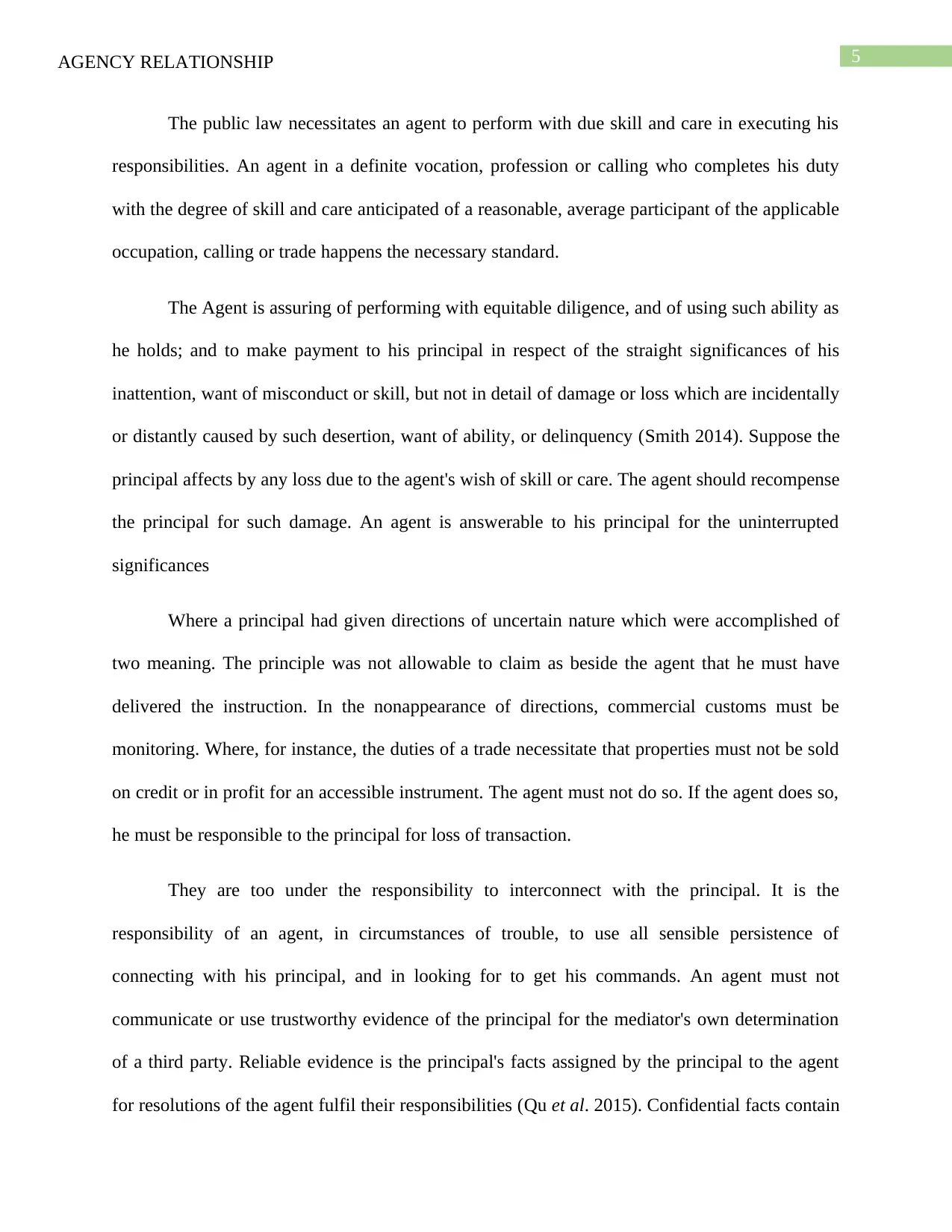
5AGENCY RELATIONSHIP
The public law necessitates an agent to perform with due skill and care in executing his
responsibilities. An agent in a definite vocation, profession or calling who completes his duty
with the degree of skill and care anticipated of a reasonable, average participant of the applicable
occupation, calling or trade happens the necessary standard.
The Agent is assuring of performing with equitable diligence, and of using such ability as
he holds; and to make payment to his principal in respect of the straight significances of his
inattention, want of misconduct or skill, but not in detail of damage or loss which are incidentally
or distantly caused by such desertion, want of ability, or delinquency (Smith 2014). Suppose the
principal affects by any loss due to the agent's wish of skill or care. The agent should recompense
the principal for such damage. An agent is answerable to his principal for the uninterrupted
significances
Where a principal had given directions of uncertain nature which were accomplished of
two meaning. The principle was not allowable to claim as beside the agent that he must have
delivered the instruction. In the nonappearance of directions, commercial customs must be
monitoring. Where, for instance, the duties of a trade necessitate that properties must not be sold
on credit or in profit for an accessible instrument. The agent must not do so. If the agent does so,
he must be responsible to the principal for loss of transaction.
They are too under the responsibility to interconnect with the principal. It is the
responsibility of an agent, in circumstances of trouble, to use all sensible persistence of
connecting with his principal, and in looking for to get his commands. An agent must not
communicate or use trustworthy evidence of the principal for the mediator's own determination
of a third party. Reliable evidence is the principal's facts assigned by the principal to the agent
for resolutions of the agent fulfil their responsibilities (Qu et al. 2015). Confidential facts contain
The public law necessitates an agent to perform with due skill and care in executing his
responsibilities. An agent in a definite vocation, profession or calling who completes his duty
with the degree of skill and care anticipated of a reasonable, average participant of the applicable
occupation, calling or trade happens the necessary standard.
The Agent is assuring of performing with equitable diligence, and of using such ability as
he holds; and to make payment to his principal in respect of the straight significances of his
inattention, want of misconduct or skill, but not in detail of damage or loss which are incidentally
or distantly caused by such desertion, want of ability, or delinquency (Smith 2014). Suppose the
principal affects by any loss due to the agent's wish of skill or care. The agent should recompense
the principal for such damage. An agent is answerable to his principal for the uninterrupted
significances
Where a principal had given directions of uncertain nature which were accomplished of
two meaning. The principle was not allowable to claim as beside the agent that he must have
delivered the instruction. In the nonappearance of directions, commercial customs must be
monitoring. Where, for instance, the duties of a trade necessitate that properties must not be sold
on credit or in profit for an accessible instrument. The agent must not do so. If the agent does so,
he must be responsible to the principal for loss of transaction.
They are too under the responsibility to interconnect with the principal. It is the
responsibility of an agent, in circumstances of trouble, to use all sensible persistence of
connecting with his principal, and in looking for to get his commands. An agent must not
communicate or use trustworthy evidence of the principal for the mediator's own determination
of a third party. Reliable evidence is the principal's facts assigned by the principal to the agent
for resolutions of the agent fulfil their responsibilities (Qu et al. 2015). Confidential facts contain
⊘ This is a preview!⊘
Do you want full access?
Subscribe today to unlock all pages.

Trusted by 1+ million students worldwide
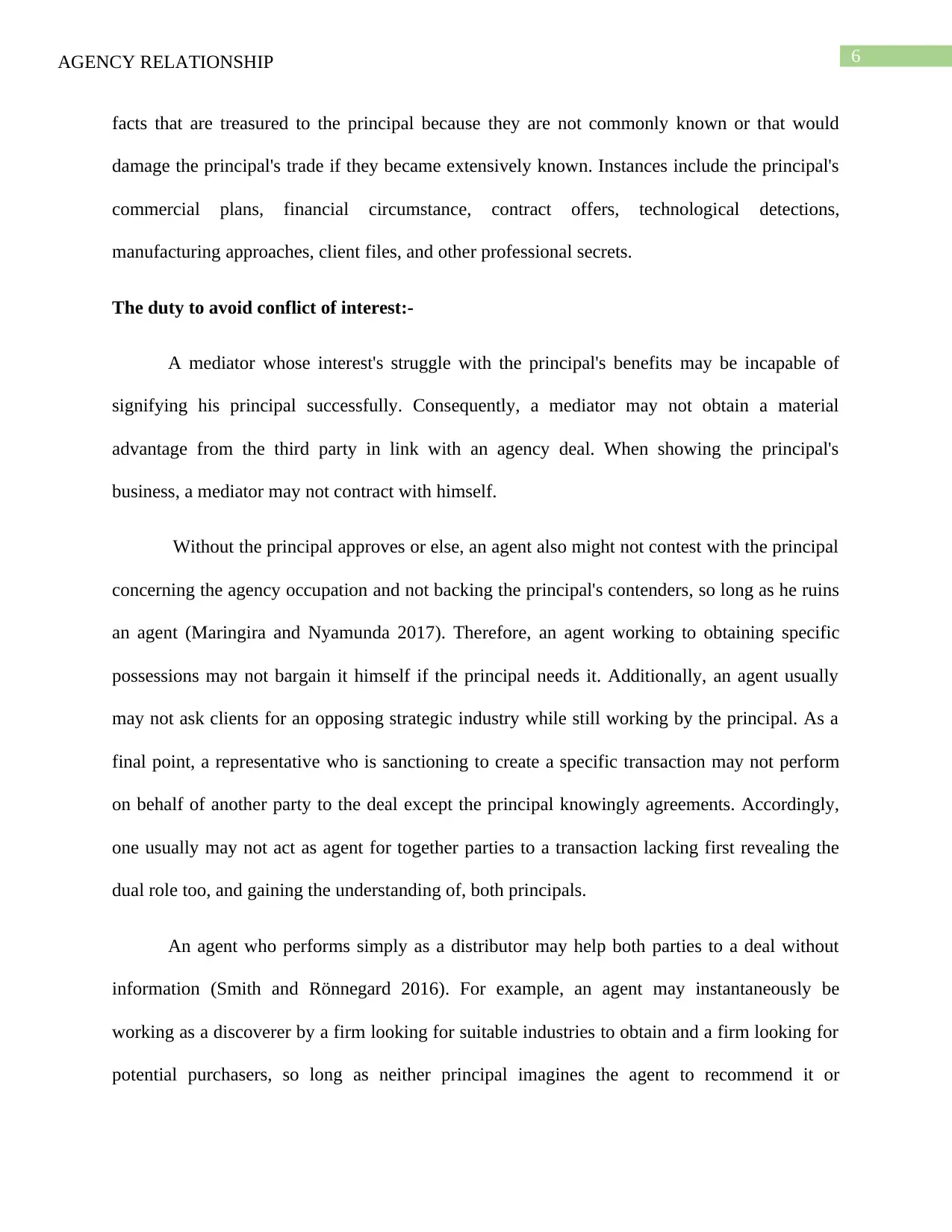
6AGENCY RELATIONSHIP
facts that are treasured to the principal because they are not commonly known or that would
damage the principal's trade if they became extensively known. Instances include the principal's
commercial plans, financial circumstance, contract offers, technological detections,
manufacturing approaches, client files, and other professional secrets.
The duty to avoid conflict of interest:-
A mediator whose interest's struggle with the principal's benefits may be incapable of
signifying his principal successfully. Consequently, a mediator may not obtain a material
advantage from the third party in link with an agency deal. When showing the principal's
business, a mediator may not contract with himself.
Without the principal approves or else, an agent also might not contest with the principal
concerning the agency occupation and not backing the principal's contenders, so long as he ruins
an agent (Maringira and Nyamunda 2017). Therefore, an agent working to obtaining specific
possessions may not bargain it himself if the principal needs it. Additionally, an agent usually
may not ask clients for an opposing strategic industry while still working by the principal. As a
final point, a representative who is sanctioning to create a specific transaction may not perform
on behalf of another party to the deal except the principal knowingly agreements. Accordingly,
one usually may not act as agent for together parties to a transaction lacking first revealing the
dual role too, and gaining the understanding of, both principals.
An agent who performs simply as a distributor may help both parties to a deal without
information (Smith and Rönnegard 2016). For example, an agent may instantaneously be
working as a discoverer by a firm looking for suitable industries to obtain and a firm looking for
potential purchasers, so long as neither principal imagines the agent to recommend it or
facts that are treasured to the principal because they are not commonly known or that would
damage the principal's trade if they became extensively known. Instances include the principal's
commercial plans, financial circumstance, contract offers, technological detections,
manufacturing approaches, client files, and other professional secrets.
The duty to avoid conflict of interest:-
A mediator whose interest's struggle with the principal's benefits may be incapable of
signifying his principal successfully. Consequently, a mediator may not obtain a material
advantage from the third party in link with an agency deal. When showing the principal's
business, a mediator may not contract with himself.
Without the principal approves or else, an agent also might not contest with the principal
concerning the agency occupation and not backing the principal's contenders, so long as he ruins
an agent (Maringira and Nyamunda 2017). Therefore, an agent working to obtaining specific
possessions may not bargain it himself if the principal needs it. Additionally, an agent usually
may not ask clients for an opposing strategic industry while still working by the principal. As a
final point, a representative who is sanctioning to create a specific transaction may not perform
on behalf of another party to the deal except the principal knowingly agreements. Accordingly,
one usually may not act as agent for together parties to a transaction lacking first revealing the
dual role too, and gaining the understanding of, both principals.
An agent who performs simply as a distributor may help both parties to a deal without
information (Smith and Rönnegard 2016). For example, an agent may instantaneously be
working as a discoverer by a firm looking for suitable industries to obtain and a firm looking for
potential purchasers, so long as neither principal imagines the agent to recommend it or
Paraphrase This Document
Need a fresh take? Get an instant paraphrase of this document with our AI Paraphraser
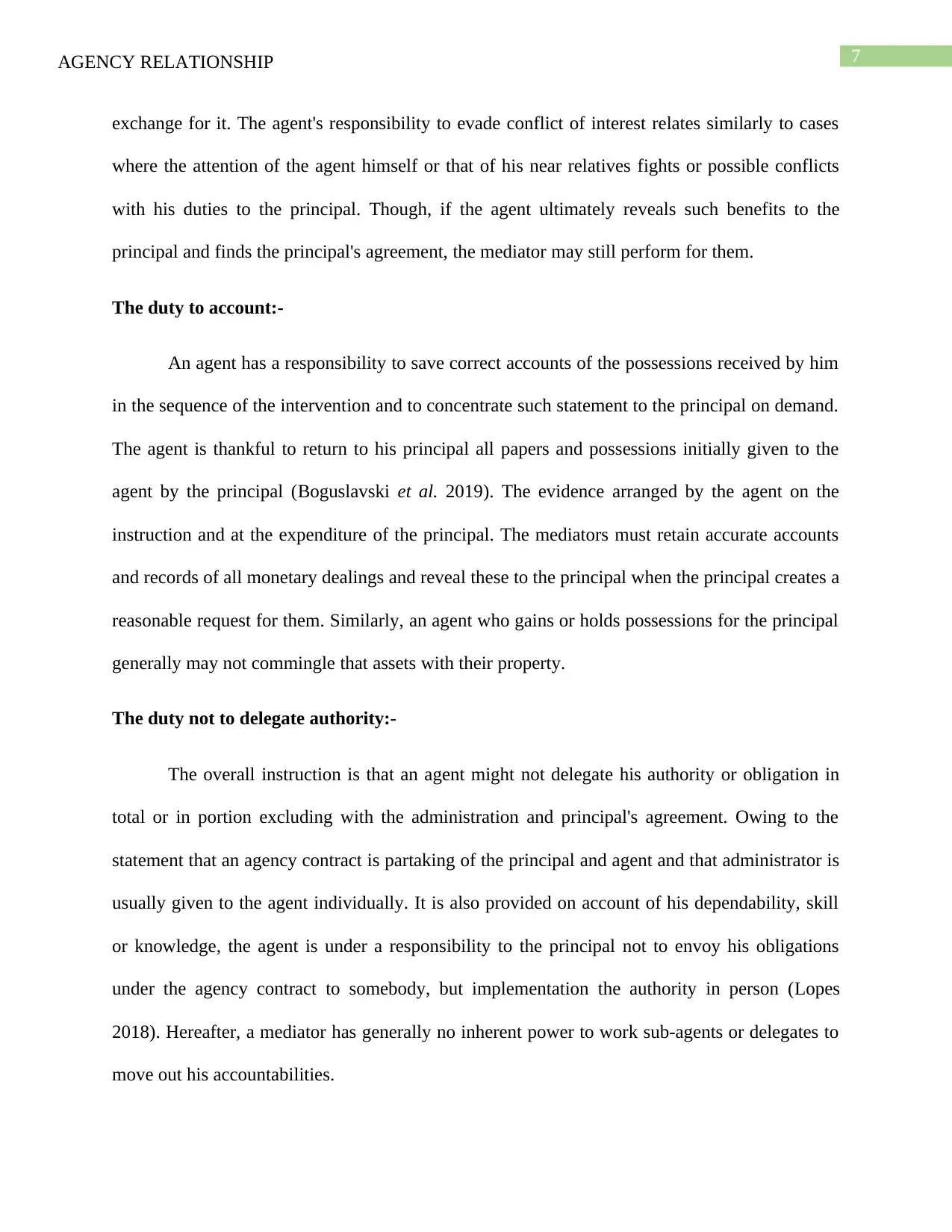
7AGENCY RELATIONSHIP
exchange for it. The agent's responsibility to evade conflict of interest relates similarly to cases
where the attention of the agent himself or that of his near relatives fights or possible conflicts
with his duties to the principal. Though, if the agent ultimately reveals such benefits to the
principal and finds the principal's agreement, the mediator may still perform for them.
The duty to account:-
An agent has a responsibility to save correct accounts of the possessions received by him
in the sequence of the intervention and to concentrate such statement to the principal on demand.
The agent is thankful to return to his principal all papers and possessions initially given to the
agent by the principal (Boguslavski et al. 2019). The evidence arranged by the agent on the
instruction and at the expenditure of the principal. The mediators must retain accurate accounts
and records of all monetary dealings and reveal these to the principal when the principal creates a
reasonable request for them. Similarly, an agent who gains or holds possessions for the principal
generally may not commingle that assets with their property.
The duty not to delegate authority:-
The overall instruction is that an agent might not delegate his authority or obligation in
total or in portion excluding with the administration and principal's agreement. Owing to the
statement that an agency contract is partaking of the principal and agent and that administrator is
usually given to the agent individually. It is also provided on account of his dependability, skill
or knowledge, the agent is under a responsibility to the principal not to envoy his obligations
under the agency contract to somebody, but implementation the authority in person (Lopes
2018). Hereafter, a mediator has generally no inherent power to work sub-agents or delegates to
move out his accountabilities.
exchange for it. The agent's responsibility to evade conflict of interest relates similarly to cases
where the attention of the agent himself or that of his near relatives fights or possible conflicts
with his duties to the principal. Though, if the agent ultimately reveals such benefits to the
principal and finds the principal's agreement, the mediator may still perform for them.
The duty to account:-
An agent has a responsibility to save correct accounts of the possessions received by him
in the sequence of the intervention and to concentrate such statement to the principal on demand.
The agent is thankful to return to his principal all papers and possessions initially given to the
agent by the principal (Boguslavski et al. 2019). The evidence arranged by the agent on the
instruction and at the expenditure of the principal. The mediators must retain accurate accounts
and records of all monetary dealings and reveal these to the principal when the principal creates a
reasonable request for them. Similarly, an agent who gains or holds possessions for the principal
generally may not commingle that assets with their property.
The duty not to delegate authority:-
The overall instruction is that an agent might not delegate his authority or obligation in
total or in portion excluding with the administration and principal's agreement. Owing to the
statement that an agency contract is partaking of the principal and agent and that administrator is
usually given to the agent individually. It is also provided on account of his dependability, skill
or knowledge, the agent is under a responsibility to the principal not to envoy his obligations
under the agency contract to somebody, but implementation the authority in person (Lopes
2018). Hereafter, a mediator has generally no inherent power to work sub-agents or delegates to
move out his accountabilities.
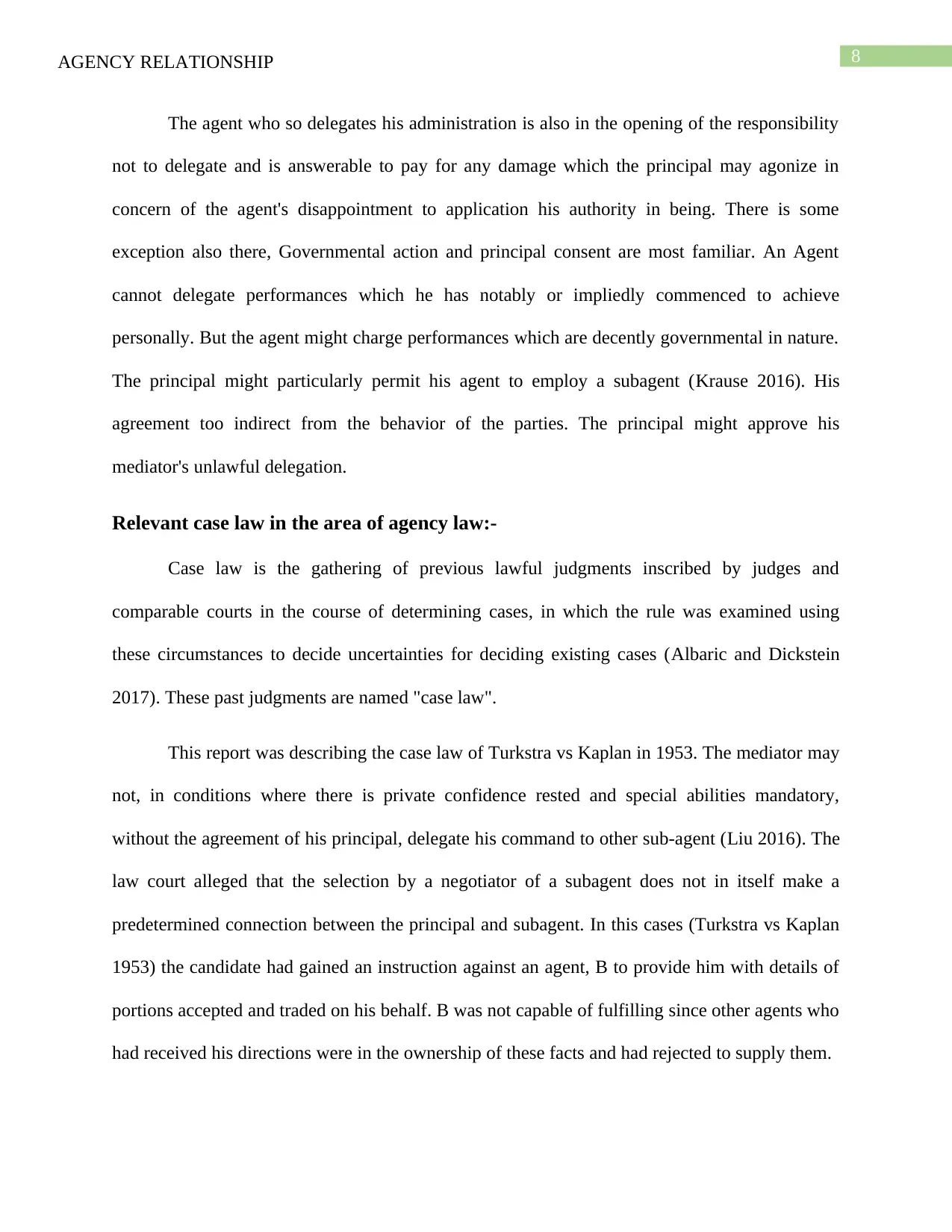
8AGENCY RELATIONSHIP
The agent who so delegates his administration is also in the opening of the responsibility
not to delegate and is answerable to pay for any damage which the principal may agonize in
concern of the agent's disappointment to application his authority in being. There is some
exception also there, Governmental action and principal consent are most familiar. An Agent
cannot delegate performances which he has notably or impliedly commenced to achieve
personally. But the agent might charge performances which are decently governmental in nature.
The principal might particularly permit his agent to employ a subagent (Krause 2016). His
agreement too indirect from the behavior of the parties. The principal might approve his
mediator's unlawful delegation.
Relevant case law in the area of agency law:-
Case law is the gathering of previous lawful judgments inscribed by judges and
comparable courts in the course of determining cases, in which the rule was examined using
these circumstances to decide uncertainties for deciding existing cases (Albaric and Dickstein
2017). These past judgments are named "case law".
This report was describing the case law of Turkstra vs Kaplan in 1953. The mediator may
not, in conditions where there is private confidence rested and special abilities mandatory,
without the agreement of his principal, delegate his command to other sub-agent (Liu 2016). The
law court alleged that the selection by a negotiator of a subagent does not in itself make a
predetermined connection between the principal and subagent. In this cases (Turkstra vs Kaplan
1953) the candidate had gained an instruction against an agent, B to provide him with details of
portions accepted and traded on his behalf. B was not capable of fulfilling since other agents who
had received his directions were in the ownership of these facts and had rejected to supply them.
The agent who so delegates his administration is also in the opening of the responsibility
not to delegate and is answerable to pay for any damage which the principal may agonize in
concern of the agent's disappointment to application his authority in being. There is some
exception also there, Governmental action and principal consent are most familiar. An Agent
cannot delegate performances which he has notably or impliedly commenced to achieve
personally. But the agent might charge performances which are decently governmental in nature.
The principal might particularly permit his agent to employ a subagent (Krause 2016). His
agreement too indirect from the behavior of the parties. The principal might approve his
mediator's unlawful delegation.
Relevant case law in the area of agency law:-
Case law is the gathering of previous lawful judgments inscribed by judges and
comparable courts in the course of determining cases, in which the rule was examined using
these circumstances to decide uncertainties for deciding existing cases (Albaric and Dickstein
2017). These past judgments are named "case law".
This report was describing the case law of Turkstra vs Kaplan in 1953. The mediator may
not, in conditions where there is private confidence rested and special abilities mandatory,
without the agreement of his principal, delegate his command to other sub-agent (Liu 2016). The
law court alleged that the selection by a negotiator of a subagent does not in itself make a
predetermined connection between the principal and subagent. In this cases (Turkstra vs Kaplan
1953) the candidate had gained an instruction against an agent, B to provide him with details of
portions accepted and traded on his behalf. B was not capable of fulfilling since other agents who
had received his directions were in the ownership of these facts and had rejected to supply them.
⊘ This is a preview!⊘
Do you want full access?
Subscribe today to unlock all pages.

Trusted by 1+ million students worldwide
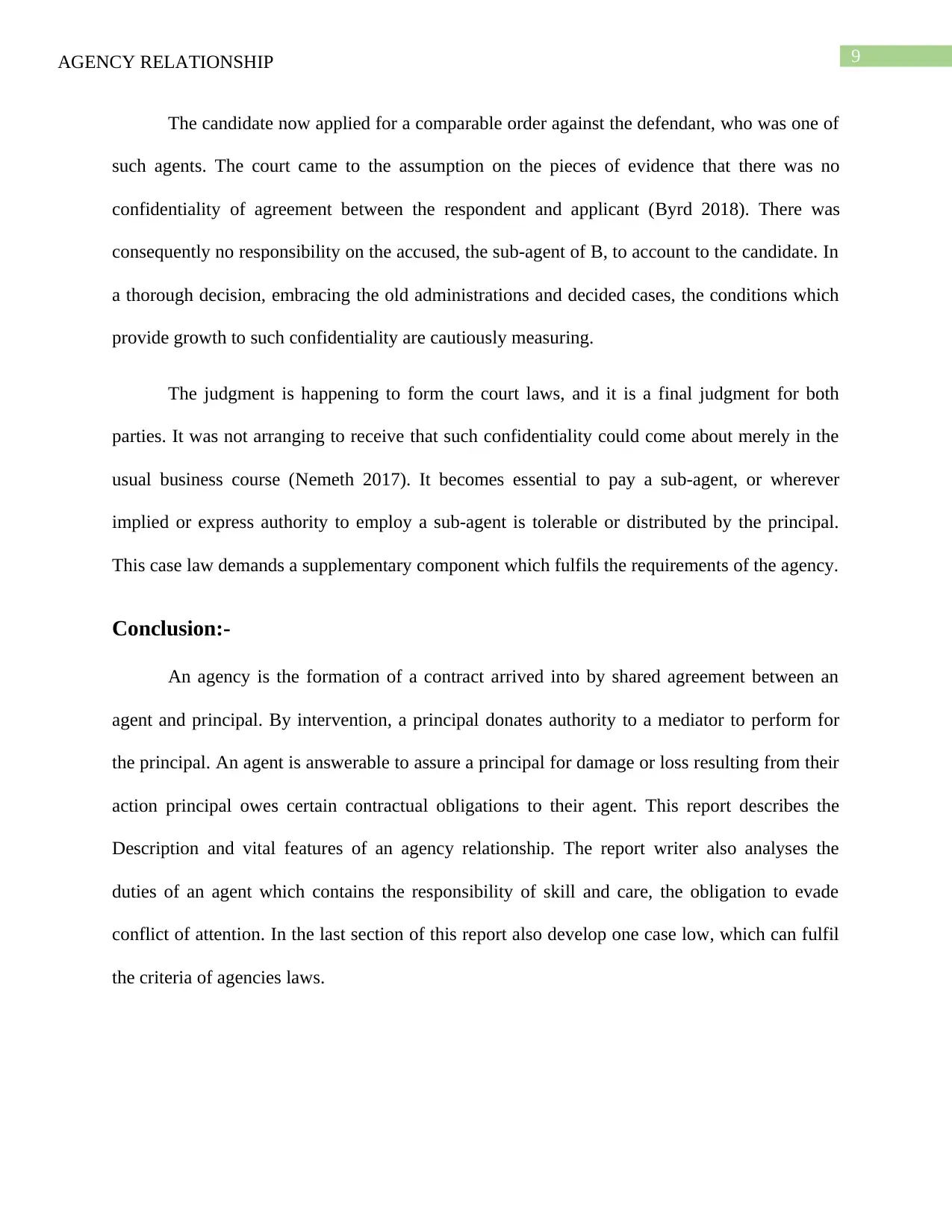
9AGENCY RELATIONSHIP
The candidate now applied for a comparable order against the defendant, who was one of
such agents. The court came to the assumption on the pieces of evidence that there was no
confidentiality of agreement between the respondent and applicant (Byrd 2018). There was
consequently no responsibility on the accused, the sub-agent of B, to account to the candidate. In
a thorough decision, embracing the old administrations and decided cases, the conditions which
provide growth to such confidentiality are cautiously measuring.
The judgment is happening to form the court laws, and it is a final judgment for both
parties. It was not arranging to receive that such confidentiality could come about merely in the
usual business course (Nemeth 2017). It becomes essential to pay a sub-agent, or wherever
implied or express authority to employ a sub-agent is tolerable or distributed by the principal.
This case law demands a supplementary component which fulfils the requirements of the agency.
Conclusion:-
An agency is the formation of a contract arrived into by shared agreement between an
agent and principal. By intervention, a principal donates authority to a mediator to perform for
the principal. An agent is answerable to assure a principal for damage or loss resulting from their
action principal owes certain contractual obligations to their agent. This report describes the
Description and vital features of an agency relationship. The report writer also analyses the
duties of an agent which contains the responsibility of skill and care, the obligation to evade
conflict of attention. In the last section of this report also develop one case low, which can fulfil
the criteria of agencies laws.
The candidate now applied for a comparable order against the defendant, who was one of
such agents. The court came to the assumption on the pieces of evidence that there was no
confidentiality of agreement between the respondent and applicant (Byrd 2018). There was
consequently no responsibility on the accused, the sub-agent of B, to account to the candidate. In
a thorough decision, embracing the old administrations and decided cases, the conditions which
provide growth to such confidentiality are cautiously measuring.
The judgment is happening to form the court laws, and it is a final judgment for both
parties. It was not arranging to receive that such confidentiality could come about merely in the
usual business course (Nemeth 2017). It becomes essential to pay a sub-agent, or wherever
implied or express authority to employ a sub-agent is tolerable or distributed by the principal.
This case law demands a supplementary component which fulfils the requirements of the agency.
Conclusion:-
An agency is the formation of a contract arrived into by shared agreement between an
agent and principal. By intervention, a principal donates authority to a mediator to perform for
the principal. An agent is answerable to assure a principal for damage or loss resulting from their
action principal owes certain contractual obligations to their agent. This report describes the
Description and vital features of an agency relationship. The report writer also analyses the
duties of an agent which contains the responsibility of skill and care, the obligation to evade
conflict of attention. In the last section of this report also develop one case low, which can fulfil
the criteria of agencies laws.
Paraphrase This Document
Need a fresh take? Get an instant paraphrase of this document with our AI Paraphraser
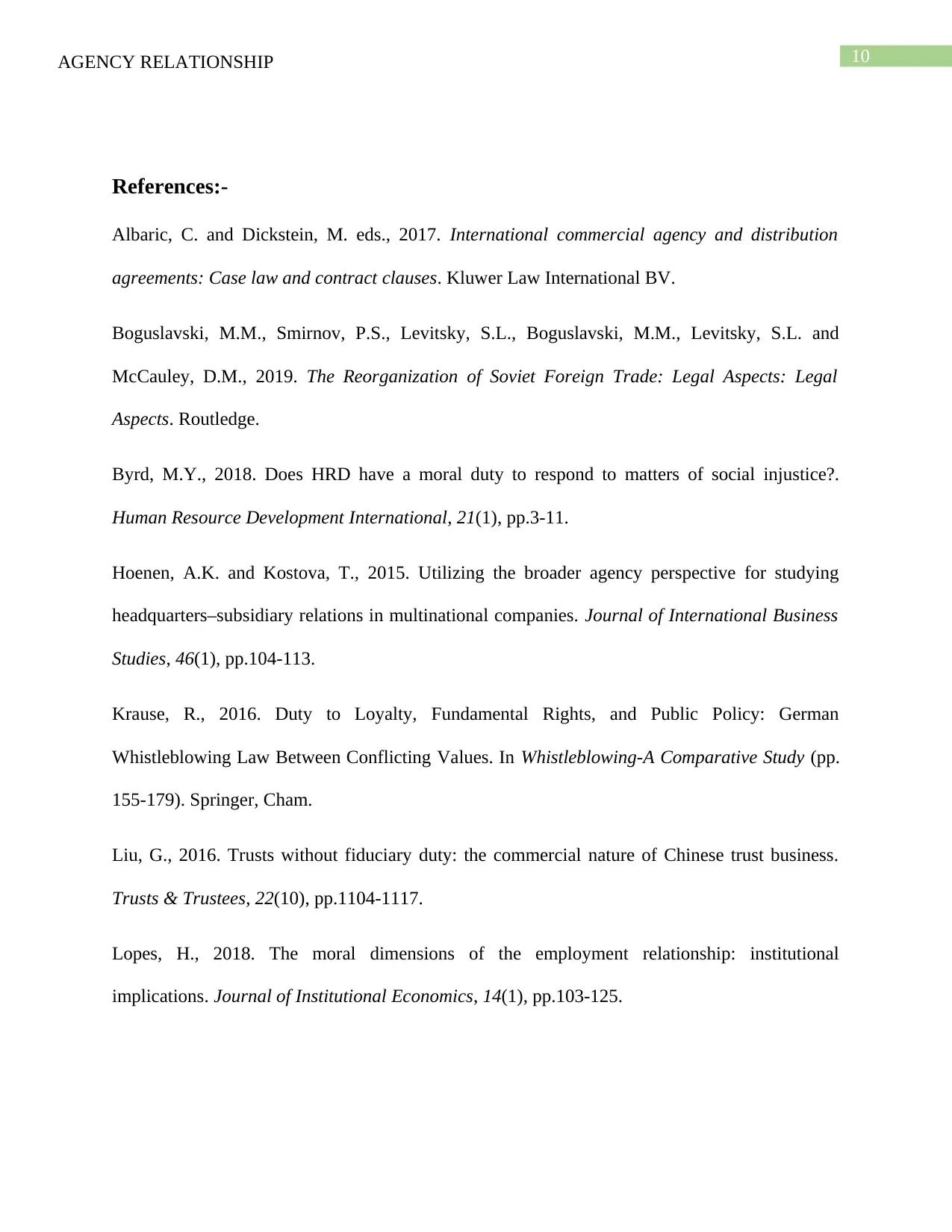
10AGENCY RELATIONSHIP
References:-
Albaric, C. and Dickstein, M. eds., 2017. International commercial agency and distribution
agreements: Case law and contract clauses. Kluwer Law International BV.
Boguslavski, M.M., Smirnov, P.S., Levitsky, S.L., Boguslavski, M.M., Levitsky, S.L. and
McCauley, D.M., 2019. The Reorganization of Soviet Foreign Trade: Legal Aspects: Legal
Aspects. Routledge.
Byrd, M.Y., 2018. Does HRD have a moral duty to respond to matters of social injustice?.
Human Resource Development International, 21(1), pp.3-11.
Hoenen, A.K. and Kostova, T., 2015. Utilizing the broader agency perspective for studying
headquarters–subsidiary relations in multinational companies. Journal of International Business
Studies, 46(1), pp.104-113.
Krause, R., 2016. Duty to Loyalty, Fundamental Rights, and Public Policy: German
Whistleblowing Law Between Conflicting Values. In Whistleblowing-A Comparative Study (pp.
155-179). Springer, Cham.
Liu, G., 2016. Trusts without fiduciary duty: the commercial nature of Chinese trust business.
Trusts & Trustees, 22(10), pp.1104-1117.
Lopes, H., 2018. The moral dimensions of the employment relationship: institutional
implications. Journal of Institutional Economics, 14(1), pp.103-125.
References:-
Albaric, C. and Dickstein, M. eds., 2017. International commercial agency and distribution
agreements: Case law and contract clauses. Kluwer Law International BV.
Boguslavski, M.M., Smirnov, P.S., Levitsky, S.L., Boguslavski, M.M., Levitsky, S.L. and
McCauley, D.M., 2019. The Reorganization of Soviet Foreign Trade: Legal Aspects: Legal
Aspects. Routledge.
Byrd, M.Y., 2018. Does HRD have a moral duty to respond to matters of social injustice?.
Human Resource Development International, 21(1), pp.3-11.
Hoenen, A.K. and Kostova, T., 2015. Utilizing the broader agency perspective for studying
headquarters–subsidiary relations in multinational companies. Journal of International Business
Studies, 46(1), pp.104-113.
Krause, R., 2016. Duty to Loyalty, Fundamental Rights, and Public Policy: German
Whistleblowing Law Between Conflicting Values. In Whistleblowing-A Comparative Study (pp.
155-179). Springer, Cham.
Liu, G., 2016. Trusts without fiduciary duty: the commercial nature of Chinese trust business.
Trusts & Trustees, 22(10), pp.1104-1117.
Lopes, H., 2018. The moral dimensions of the employment relationship: institutional
implications. Journal of Institutional Economics, 14(1), pp.103-125.
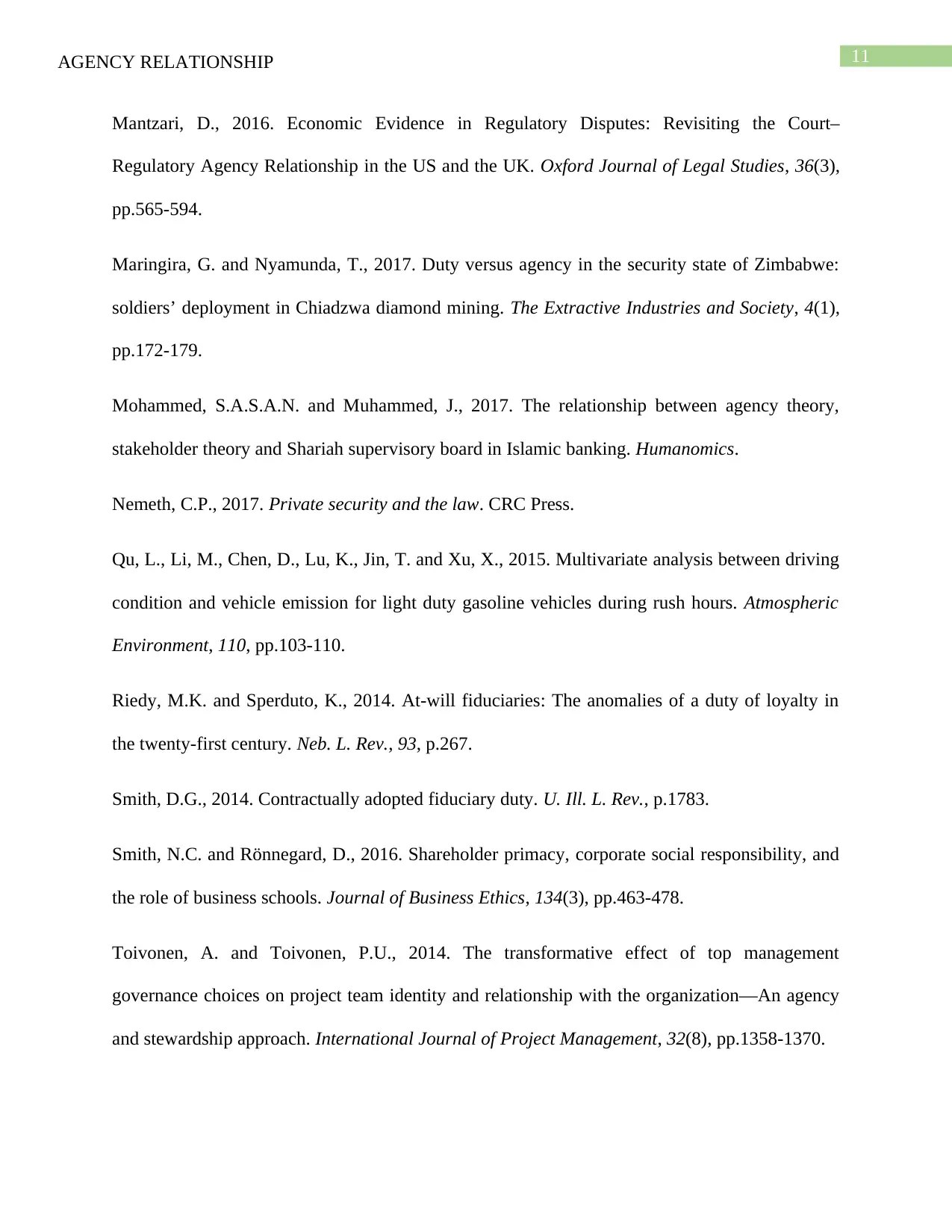
11AGENCY RELATIONSHIP
Mantzari, D., 2016. Economic Evidence in Regulatory Disputes: Revisiting the Court–
Regulatory Agency Relationship in the US and the UK. Oxford Journal of Legal Studies, 36(3),
pp.565-594.
Maringira, G. and Nyamunda, T., 2017. Duty versus agency in the security state of Zimbabwe:
soldiers’ deployment in Chiadzwa diamond mining. The Extractive Industries and Society, 4(1),
pp.172-179.
Mohammed, S.A.S.A.N. and Muhammed, J., 2017. The relationship between agency theory,
stakeholder theory and Shariah supervisory board in Islamic banking. Humanomics.
Nemeth, C.P., 2017. Private security and the law. CRC Press.
Qu, L., Li, M., Chen, D., Lu, K., Jin, T. and Xu, X., 2015. Multivariate analysis between driving
condition and vehicle emission for light duty gasoline vehicles during rush hours. Atmospheric
Environment, 110, pp.103-110.
Riedy, M.K. and Sperduto, K., 2014. At-will fiduciaries: The anomalies of a duty of loyalty in
the twenty-first century. Neb. L. Rev., 93, p.267.
Smith, D.G., 2014. Contractually adopted fiduciary duty. U. Ill. L. Rev., p.1783.
Smith, N.C. and Rönnegard, D., 2016. Shareholder primacy, corporate social responsibility, and
the role of business schools. Journal of Business Ethics, 134(3), pp.463-478.
Toivonen, A. and Toivonen, P.U., 2014. The transformative effect of top management
governance choices on project team identity and relationship with the organization—An agency
and stewardship approach. International Journal of Project Management, 32(8), pp.1358-1370.
Mantzari, D., 2016. Economic Evidence in Regulatory Disputes: Revisiting the Court–
Regulatory Agency Relationship in the US and the UK. Oxford Journal of Legal Studies, 36(3),
pp.565-594.
Maringira, G. and Nyamunda, T., 2017. Duty versus agency in the security state of Zimbabwe:
soldiers’ deployment in Chiadzwa diamond mining. The Extractive Industries and Society, 4(1),
pp.172-179.
Mohammed, S.A.S.A.N. and Muhammed, J., 2017. The relationship between agency theory,
stakeholder theory and Shariah supervisory board in Islamic banking. Humanomics.
Nemeth, C.P., 2017. Private security and the law. CRC Press.
Qu, L., Li, M., Chen, D., Lu, K., Jin, T. and Xu, X., 2015. Multivariate analysis between driving
condition and vehicle emission for light duty gasoline vehicles during rush hours. Atmospheric
Environment, 110, pp.103-110.
Riedy, M.K. and Sperduto, K., 2014. At-will fiduciaries: The anomalies of a duty of loyalty in
the twenty-first century. Neb. L. Rev., 93, p.267.
Smith, D.G., 2014. Contractually adopted fiduciary duty. U. Ill. L. Rev., p.1783.
Smith, N.C. and Rönnegard, D., 2016. Shareholder primacy, corporate social responsibility, and
the role of business schools. Journal of Business Ethics, 134(3), pp.463-478.
Toivonen, A. and Toivonen, P.U., 2014. The transformative effect of top management
governance choices on project team identity and relationship with the organization—An agency
and stewardship approach. International Journal of Project Management, 32(8), pp.1358-1370.
⊘ This is a preview!⊘
Do you want full access?
Subscribe today to unlock all pages.

Trusted by 1+ million students worldwide
1 out of 13
Related Documents
Your All-in-One AI-Powered Toolkit for Academic Success.
+13062052269
info@desklib.com
Available 24*7 on WhatsApp / Email
![[object Object]](/_next/static/media/star-bottom.7253800d.svg)
Unlock your academic potential
Copyright © 2020–2026 A2Z Services. All Rights Reserved. Developed and managed by ZUCOL.




